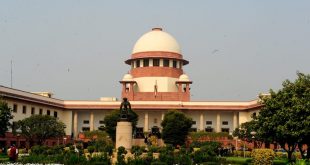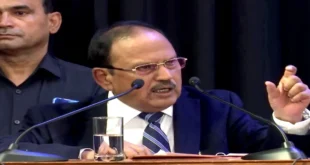New Delhi “Nov 7 (PMI): Thick clouds of smog shrouded parts of the national capital as the air quality across the metropolitan city continued to remain in ‘severe’ category on Tuesday, according to the Central Pollution Control Board (CPCB).
According to the data shared by the CPCB, the Air Quality Index (AQI) in Anand Vihar was recorded at 440, 388 at Narela, 434 at Punjabi Bagh, 431 at RK Puram, and 408 at Shadipur, all in the ‘severe category zone’.
Likewise, the AQI at Jahangirpuri was recorded at 416, 404 at IGI Airport, 337 at Pusa Road, and 407 at Sonia Vihar.
On Monday, Gurgaon Police restricted the entry of trucks into Delhi-NCR due to poor air quality. The restrictions apply to heavy vehicles, commercial vehicles with BS 3 petrol engines, BS 4 diesel vehicles, LMVs (four-wheelers), and trucks carrying non-essential goods. It also applies to diesel-run medium goods vehicles (MGVs) and heavy goods vehicles (HGVs).
Gurgaon Police in an advisory said, “The general public is hereby informed that due to poor air quality in Delhi-NCR, as per the rules of GRAP, heavy vehicles, commercial vehicles with BS 3 petrol engines, BS 4 diesel vehicles, LMV (four-wheelers), are restricted from entering the Delhi-NCR area
Meanwhile, the Gurugram-Mahipalpur area also remained enveloped in the haze of smoke and fog early this morning.The city’s Air Quality Index has remained hazardous for the sixth consecutive day this week.”Speaking on the issue of Delhi pollution, a morning walker said, “Everyone is facing problems because of smog. It is harmful to our health. The government should pay attention to controlling this.”
Delhi Environment Minister Gopal Rai called a meeting of all concerned departments on Monday in view of the increasing pollution. The meeting also conducted discussions on the strict implementation of GRAP-4.This came after the Commission for Air Quality Management (CAQM) on Sunday decided to invoke Stage IV of the Graded Response Action Plan (GRAP) in the entire National Capital Region (NCR) with immediate effect to prevent further deterioration of air quality.
The Air Quality Commission said that Stage IV will be implemented in addition to the restrictions placed under Stage I to III.The Graded Response Action Plan (GRAP) is a set of guidelines and measures implemented to combat air pollution in the National Capital Region (NCR) of India, which includes Delhi and its surrounding areas.
Air pollution levels can be high during the winter months for a number of reasons, including dust and vehicular pollution, dry-cold weather, stubble burning, burning crop residues after the harvest season, and commuting.Cold air is denser and moves slower than warm air, so it traps pollution and doesn’t whisk it away. This means that air pollution in winter remains in place for much longer than during the summer.
According to doctors, for any healthy person, a recommended AQI should be less than 50, but these days the AQI has spiked beyond 400, which could prove fatal for those suffering from lung-related diseases and even poses a risk of lung cancer.
 Pressmediaofindia
Pressmediaofindia




